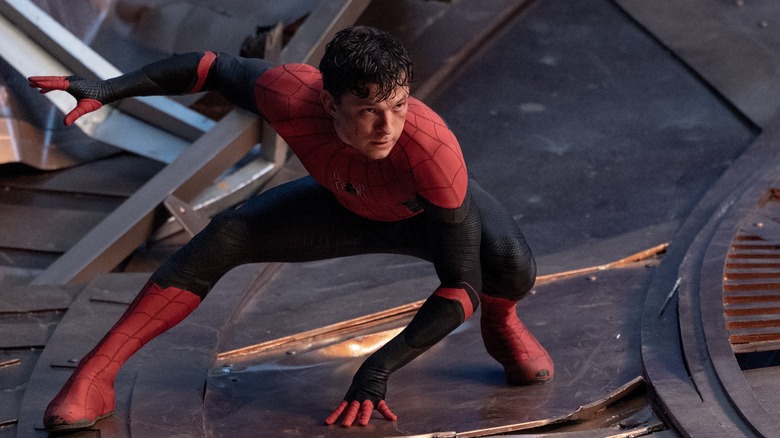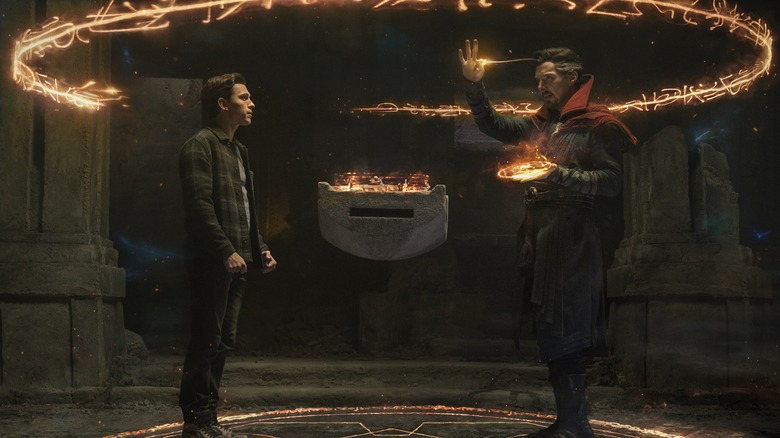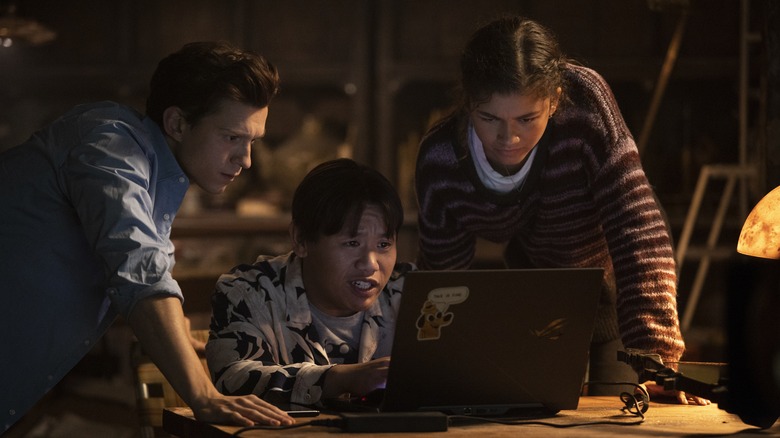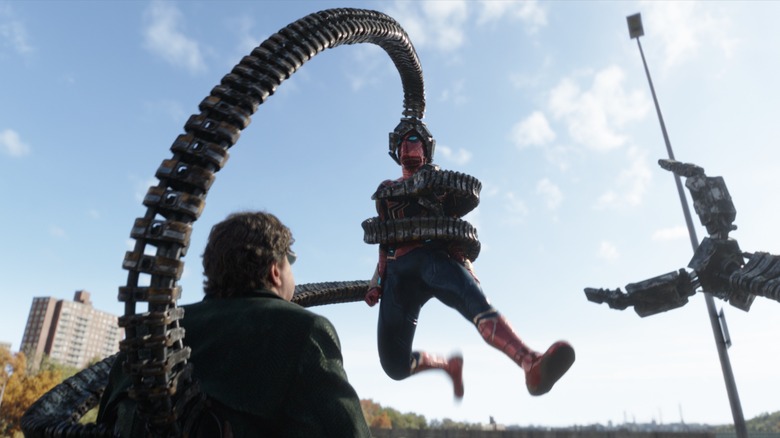Spider-Man: No Way Home Review: A Web Of Genuine Character Drama And Fan Service
What makes a Spider-Man? Is it the spider powers? The tragic backstory? The dilemma of the dual identity? The injustice of being penniless while being targeted by a ruthless media circus that frames him as a monster? The plight of Peter Parker is so irresistible that each of the "Spider-Man" movies can't help but try to tackle it in some way, putting a twist on that familiar origin story by introducing some fresh tragedy. But Tom Holland's Spider-Man hasn't really had the chance to have his origin story — introduced swiftly in the supersized extravangaza that was "Captain America: Civil War," and getting set up for teen superhero antics by his mentor/father figure Tony Stark in his first film "Spider-Man: Homecoming." It took a little time, but Holland's Peter Parker finally gets an origin story of sorts with "Spider-Man: No Way Home," a whirlwind universe-shattering adventure that might best be described as fan service with heart.
There's a lot to be nervous about with "Spider-Man: No Way Home," a film tasked with bridging the gap between the Marvel and Sony Spider-universes, introducing a novel concept (the multiverse) to the next phase of the Marvel Cinematic Universe, and following up that whopper of a cliffhanger from "Far From Home," in which Spider-Man's secret identity was revealed to the entire world. It's a miracle that the movie has any time for Peter Parker at all. But despite all the clutter and the chaos, "Spider-Man: No Way Home" manages to bring it — well — home, for Holland's Peter Parker. And it does it by looking back at the past and grappling with the legacy of Spider-Man, both in-universe and out (pun intended).
Doctoring Fate
Now viewed by the entire world as the murderer of Mysterio (Jake Gyllenhaal), Peter Parker finds himself put on trial — by both the media and the federal government. But the worst of it is that his loved ones are suffering for Mysterio's deceptions: Ned (Jacob Batalon) and MJ (Zendaya) are pelted with questions and unwanted attention at school, while Aunt May's apartment is literally pelted with bricks from those who claim "Mysterio was right." Conspiracy theories, as sold by online shock jock J. Jonah Jameson (J.K. Simmons, relishing inhabiting the outrageous role once again), are the order of the day. But amid all the federal interrogations and alternately mistrusting and idolizing teachers, Peter has only one wish: to get into MIT with MJ and Ned. For much of the first 20 minutes of the film, "No Way Home" is astonishingly low stakes, following Peter on this breathless montage of how his revealed identity has now upended his life, while he eagerly waits for college admissions letters.
In this way, it's like the script by Chris McKenna and Erik Sommer (who collaborated with director Jon Watts on both "Homecoming" and "Far From Home") is attempting to recreate that low-key charm of the first film, which itself felt like a John Hughes teen flick run through the Marvel machine. But despite the mundane charms of "Homecoming," there has never really been a "normal" for Holland's Peter Parker, who has only seen his life escalate to alarming heights in a few short years. "Since I became Spider-Man, there's only been one week where I felt normal," Peter bemoans to MJ. And "No Way Home" has no time for normal — making this low-stakes montage feel out of place, if not like a rushed depiction of Peter Parker's existential crisis experienced in films like "Spider-Man 2" — except with more jokes, and hyper self-aware high school kids that feel like they were lifted directly out of a Netflix movie. But to go to the lengths that Peter does, you have to understand what he wishes for.
Trying to Fix It
Peter's solution is dramatic: magic. Denied admission by MIT and feeling trapped by his identity, Peter approaches Doctor Stephen Strange (Benedict Cumberbatch, whose increasingly irate attitude becomes very fun to watch) with a request: a spell that can make the whole world forget that he's Spider-Man. Oh wait, except MJ. Oh, and Ned too. And he can't go through all that with his Aunt May again! Peter's many interruptions corrupt the spell, leading Doctor Strange to use all his might to contain it — but not before a few multiversal stragglers sneak through.
Peter soon learns the destructive consequences of his actions, as he's attacked by Doctor Octopus (Alfred Molina, reprising his role from Sam Raimi's "Spider-Man 2"), Green Goblin (Willem Dafoe, putting on the suit again 19 years after Raimi's Spider-Man"), Lizard (Rhys Ifans, Marc Webb's "The Amazing Spider-Man"), Electro (Jamie Foxx, Webb's "The Amazing Spider-Man 2"), and Sandman (Thomas Haden Church, Raimi's "Spider-Man 3"), villains from other universes who all believe he's their Peter Parker.
Peter — a sweetheart inspired by his charitable Aunt May (a sorely underused Marisa Tomei) — can't bring himself to send the multiverse villains back to their dooms at the hands of their individual Spider-Men. So he resolves to use some unearthed Stark technology to "fix" them — sabotaging Doctor Strange's spell once again, this time on purpose. Something the Holland "Spider-Man" films had rarely done — and which both the Andrew Garfield and Tobey Maguire movies had done in spades — was show just how destructive Peter Parker could be. Holland's Peter is still just a kid, and he makes the mistake any naïve child would — he wants to stop as much death as he can. It's a refreshingly relatable depiction of Holland's Peter making a childish choice that will obviously end badly (unlike the "Far From Home" drone situation). But Spider-Man's whims, as well-motivated as they are, can lead to untold tragedies, as Holland's Peter will soon find out.
Fan Service Serving the Character
"Spider-Man: No Way Home" is at its best and its worst when it's recalling other movies. Not only does it adopt many, many lines of dialogue from the Raimi films, it also dips into the trippy visuals of "Doctor Strange," giving its (admittedly still flat and uneven) aesthetic a pop of excitement. There is a childlike joy to seeing Molina repeat his character's most famous lines ("the power of the sun ... in my hand") but also a gross sadness to seeing that line so separated from its context that it plays like satire. "No Way Home" can't resist poking fun at the heightened drama of the Raimi films, with your usual glib one-liners about people's "real names" and "being careful which toxic vats you fall in." But despite the smugness it's inherited from its MCU brethren, there's an aw-shucks sincerity to Holland's Peter Parker that continues to charm, and shines brighter in the face of outsized villains like Dafoe's Green Goblin. Dafoe slips into the role as if he never left, wielding that same unhinged grin and wide, unblinking eyes, falling right into that creepy Goblin voice he adopted for the dark side of Norman Osborn. It's no surprise that Dafoe is the villain that runs away with the movie, and takes becomes the primary driver of Peter's conflict.
And yet, despite its flaws, despite the blatant nature of the fan service, it works. As clunkily executed as it can be, fan service doesn't necessarily need to be a bad thing, especially when it services a larger thematic purpose: grappling with Spider-Man's legacy. The multiversal villains are fated to die at the hands of Spider-Man, Peter Parker learns. Wherever Spider-Man goes, "death and destruction follows," J. Jonah Jameson blusters. Later on, Peter has to confront himself and confront his legacy in a way that plays to the nostalgia for the past two "Spider-Man" series, while actually serving Peter's character. It's a happy marriage of fan service and character writing that ultimately works — despite the overlong winking banter and riffs between certain characters.
If you poke too many holes in the narrative, "Spider-Man: No Way Home" starts to become undone. But if you take it at face value, it's a sweet, moving swing of a "Spider-Man" film that (mostly) manages to land.
/Film Rating: 7 out of 10



